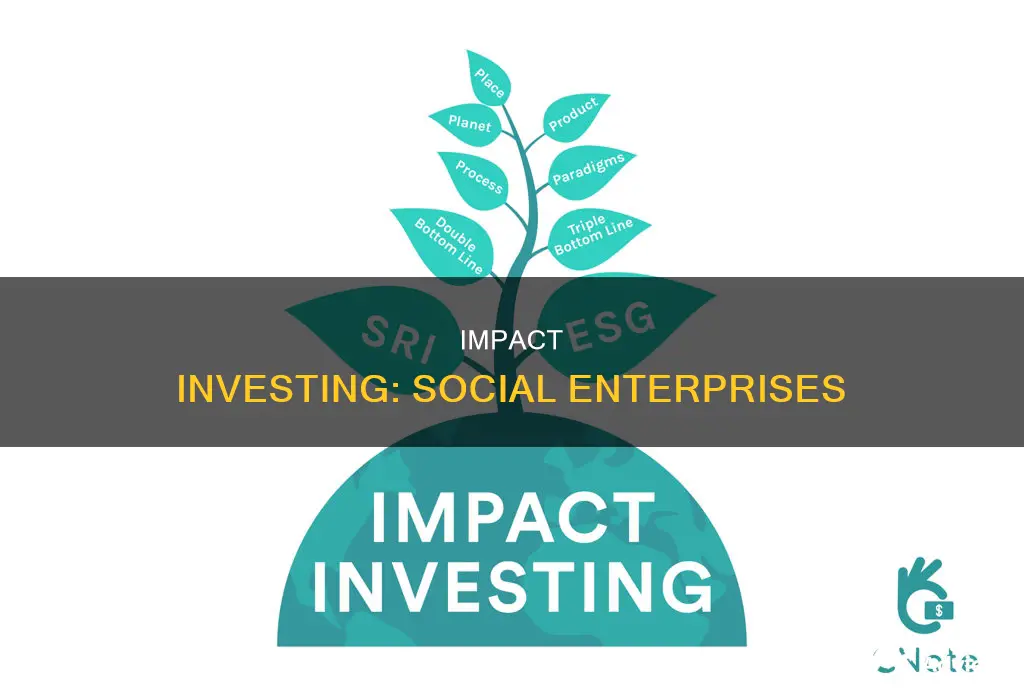
Social enterprises are businesses with a social purpose that put people and the planet first. They are committed to solving pressing issues like climate change, poverty, and inequality, and driving social change. Unlike traditional businesses, social enterprises prioritise social impact and environmental responsibility over maximising profits, and reinvest their profits into their social mission. As a result, they require funding and investment to get off the ground and sustain their activities.
Social enterprises often obtain funding by selling goods and services, but they may also receive grants and donations. They can be structured as for-profit or non-profit organisations, and may take various legal forms, including cooperatives, mutual organisations, benefit corporations, and charities.
Investors are attracted to social enterprises because they want to create social value and contribute to a greener, healthier, and more equitable world. They are willing to accept the high-risk, low return reality of investing in social enterprises, as they seek innovative solutions to complex social and environmental issues that can be scaled up to maximise benefits for society.
What You'll Learn

To create social value
People invest in social enterprises to create social value. Social enterprises are businesses with social objectives that serve as their primary purpose. They seek to maximise profits to fund social programs while also maximising benefits to society and the environment. Unlike charities, social enterprises pursue endeavours that generate revenue to fund their social causes.
Social enterprises are distinct from traditional businesses in that they go beyond a focus on revenue and profit alone. They put people and the planet first, driving tangible solutions to pressing issues like climate change and poverty. For example, Warby Parker is an American eyeglass retailer that donates a pair of glasses to someone in need for every pair sold. Similarly, TOMS, a California-based retailer, has pledged to donate a pair of shoes or sunglasses for every pair sold.
Social enterprises also positively impact the lives of millions by creating and maintaining jobs for marginalised communities, adopting green business models, and leveraging digital tools to deploy distributive ownership models. They are highly participatory, with stakeholders actively involved and a minimum number of paid employees.
XRP Investors: How Many?
You may want to see also

To generate returns acceptable to financial markets
Investors choose to put their money into social enterprises for a variety of reasons, including the potential for financial returns that match or exceed those of traditional investments. Social enterprises can offer attractive investment opportunities because they operate at the intersection of business and social impact, providing both financial gains and contributions to society. These enterprises often address societal challenges through innovative business models, and their success in creating positive impact is closely linked to their financial performance. This makes social enterprises attractive to impact investors who seek to generate financial returns while also creating measurable social or environmental value.
The concept of generating returns acceptable to financial markets is based on the idea that social enterprises can provide competitive financial returns while also creating social value. This is often referred to as the "double bottom line" of social enterprise, indicating that financial sustainability and social impact are equally important goals. By investing in these enterprises, investors expect to receive financial returns that are comparable to, or better than, those available in traditional investment opportunities. This expectation is driven by the belief that social enterprises, with their innovative and impact-driven nature, have the potential to deliver strong financial performance.
The financial returns generated by social enterprises can take various forms, depending on the specific structure and objectives of the enterprise. Some social enterprises may offer equity investments, providing investors with the potential for capital gains and dividends. Others may issue debt instruments, offering fixed returns in the form of interest payments. There are also impact investment funds that pool capital from multiple investors to provide financing to a portfolio of social enterprises, diversifying the risk and return profile. These investment structures allow social enterprises to access the capital they need to grow and scale their impact, while providing investors with the opportunity to generate financial returns that meet or exceed market expectations.
It is important to note that the returns generated by social enterprises are not solely financial. The social and environmental impact created by these enterprises is also considered a valuable return on investment for impact investors. This impact can take many forms, such as improved access to education or healthcare, reduced poverty or environmental sustainability. Impact investors often assess the social return on investment (SROI) to quantify the social value created relative to the capital invested. By considering both financial and social returns, investors can make informed decisions that align with their impact goals while also seeking competitive financial returns.
To conclude, investing in social enterprises with the goal of generating returns acceptable to financial markets involves seeking competitive financial returns alongside creating positive social impact. This dual pursuit is what sets impact investing in social enterprises apart from traditional investment approaches. By providing capital to these enterprises, investors contribute to their growth and scalability, enabling them to address societal challenges more effectively while also generating financial returns that meet market expectations. This blend of financial and social value creation makes social enterprises an attractive investment opportunity for those seeking both profit and purpose.
Investor Priority: Peace of Mind
You may want to see also

To kick-start an organisation
Investing in a social enterprise can be a great way to kick-start an organisation. Here are some key reasons why:
Access to Funding
For any new organisation, funding is crucial to getting off the ground. Social enterprises often require capital to invest in product or service design and development, staffing, IT systems, and marketing to build brand awareness. While traditional grants and donations are one way to secure funding, social enterprises can also tap into a wider range of funding sources by treating charitable donations as a form of capital that seeks social returns rather than financial ones. This opens the door to funding from venture capital firms, banks, mutual funds, and bonds.
Attracting Investors
Social enterprises, particularly start-ups, are typically high-risk investments as they lack a track record of success. However, social investors are often willing to accept this risk as they are motivated by creating social value and driving positive societal change. These investors are prepared to accept lower financial returns in exchange for the potential for significant social impact. Therefore, social enterprises can attract investors who are aligned with their values and mission.
Innovation and Scalability
Investors are drawn to innovative solutions that address complex social and environmental issues. Social enterprises that demonstrate a unique approach to tackling societal needs through their commercial activities can attract investors looking to maximise social benefit. Additionally, investors are interested in ventures with the potential for scalability, enabling them to reach a wider audience and create even greater social value.
Community Impact
Social enterprises are deeply rooted in their communities and are committed to creating positive change at a local level. They focus on serving the needs of their community, such as providing housing for low-income families or job training. By investing in a social enterprise, you are directly contributing to the improvement and empowerment of the community it serves.
Long-term Sustainability
Unlike traditional charities that heavily rely on external funding, social enterprises strive for financial sustainability by generating revenue through the sale of goods and services. This revenue is then reinvested into the organisation's mission, ensuring long-term viability. Social enterprises are dynamic and adaptable, ensuring they remain responsive to the evolving needs of their communities.
In summary, investing in a social enterprise to kick-start an organisation offers a unique opportunity to combine financial gains with social impact. By attracting investors who share their values and mission, social enterprises can access the funding and resources necessary to grow and create positive change in their communities.
The Roaring 20s: Investment Trends
You may want to see also

To maintain cash flow
Maintaining a healthy cash flow is essential for any business, and social enterprises are no exception. Social enterprises are hybrid organisations that aim to balance financial gains with social impact. While they are not primarily profit-driven, revenue is still crucial for their sustainability and ability to carry out their social mission.
The Challenge of Cash Flow for Social Enterprises
Social enterprises, like any other business, need to manage their cash flow effectively to ensure they can cover their expenses and continue their operations. This can be particularly challenging for social enterprises, as they often have a complex financial structure, blending funding from grants, investors, and revenue from selling goods and services.
Sources of Funding for Social Enterprises
Social enterprises can access funding from various sources, including grants, loans, equity infusions, or self-funding by the entrepreneur. However, they may face challenges in obtaining funding due to their unique structure, as they cannot offer large financial returns to investors, and their primary goal is not profit maximisation.
The Role of Investors in Maintaining Cash Flow
Investors play a crucial role in helping social enterprises maintain their cash flow. They provide the necessary capital to cover operational costs, finance contracts, or manage gaps in cash flow. Investors who choose to support social enterprises are often prepared to accept the "high-risk, low-return" nature of these investments, driven by their desire to create social value.
Types of Investments for Cash Flow Management
There are different types of investments that are specifically designed to help social enterprises manage their cash flow:
- Working capital: This type of investment provides social enterprises with the necessary funds to finance their everyday operations and maintain sufficient money in the bank.
- Bridging loan: A one-off loan that helps bridge a bigger gap in cash flow, such as unexpected costs or late payments from customers.
- Standby or overdraft facility: This type of facility allows social enterprises to access additional funds when needed to cover short-term cash flow shortages.
Strategies for Effective Cash Flow Management
To maintain a healthy cash flow, social enterprises should focus on minimising the costs of capital and seeking profitability. While they may not distribute profits to shareholders, generating profits is vital to sustain and grow their business and ensure they do not erode their capital base.
In conclusion, maintaining cash flow is a critical aspect of running a successful social enterprise. By accessing the right types of investments and effectively managing their finances, social enterprises can ensure they have the necessary funds to cover their expenses, continue their operations, and ultimately, achieve their social impact goals.
Stock Market: Invest Now or Later?
You may want to see also

To scale-up and innovate
Social enterprises are attractive investment prospects as they offer a unique opportunity to support innovative and impactful solutions to social and environmental issues. These enterprises often address complex problems that require creative, scalable answers. Investors are keen to back these ventures as they provide a double return—a financial gain and a measurable social impact. This impact investing is a powerful tool to create long-lasting change and improve the world. With a social enterprise, investors can support a business that has a unique, innovative idea with the potential to disrupt traditional markets and create a new, better norm.
Investors are crucial in helping social enterprises scale up their operations and increase their reach. This scaling process is vital to increase the enterprise's impact and create a more significant difference in the world. Investors bring not only financial support but also strategic guidance, mentorship, and access to networks and expertise. This guidance is invaluable as social enterprises often require a unique approach to scale sustainably and effectively. The right investors can help these businesses innovate and adapt their practices to reach new heights and serve more people.
The nature of social enterprises means they often operate with limited resources and must be innovative with their practices. Investors are keen to support these innovative business models, which can demonstrate a strong understanding of their market and a clear strategy for growth. This innovation is key to attracting investors, as it showcases the enterprise's ability to adapt, be resilient, and create effective solutions with limited means. This is an attractive prospect for investors, especially those with a passion for supporting impactful, sustainable businesses.
Social enterprises often have a strong, dedicated customer base passionate about the enterprise's mission and values. This customer loyalty is a powerful asset, and investors recognize its value. By investing in these enterprises, there is an opportunity to tap into this dedicated market and scale the business to reach a wider, global audience. Investors can support the enterprise in expanding its operations, developing new products or services, and ultimately increasing its impact and influence. This scaling process is an attractive prospect, as it offers the potential for significant financial and social returns.
GICs: Safe, Secure, and Simple
You may want to see also
Frequently asked questions
A social enterprise is a business with specific social objectives that serve its primary purpose. Social enterprises seek to maximize profits while maximizing benefits to society and the environment, and the profits are principally used to fund social programs.
Social enterprises offer investors the opportunity to create social value and drive positive societal change while also generating financial returns. They provide innovative solutions to complex social and environmental issues, contributing to a greener, healthier, and more equitable world.
Social enterprises prioritize social impact and environmental sustainability over profit maximization. They focus on creating social value and addressing pressing issues like climate change, poverty, and social inequality. Unlike traditional businesses, they are driven by a mission to benefit society rather than solely maximize profits.
Social enterprises, especially start-ups, are considered high-risk investments due to their focus on social impact. They may not offer significant financial returns, and investors need to be comfortable with the potential for lower monetary gains. Additionally, measuring social impact and establishing standardized metrics can be challenging.
Social enterprises attract a range of investors, including venture capital firms, banks, mutual funds, and philanthropic organizations. These investors are often impact-driven and willing to accept lower financial returns in exchange for contributing to social and environmental causes.







